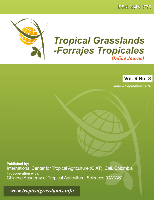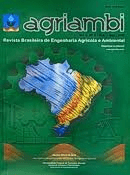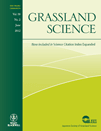
Tropical Grasslands-Forrajes Tropicales
Scope & Guideline
Exploring innovations in agronomy and ecology.
Introduction
Aims and Scopes
- Forage Crop Research:
The journal primarily features studies on various tropical forage crops, focusing on their agronomic characteristics, yield potential, and nutritional value. - Soil and Environmental Interactions:
Research on how different forage systems affect soil health, nutrient cycling, and overall ecosystem sustainability is a core focus area. - Animal Nutrition and Livestock Production:
The impact of forage quality on livestock performance and health is extensively covered, with studies exploring feeding strategies and animal management. - Innovative Agricultural Practices:
The journal promotes research on innovative practices, including the use of technology in agriculture, such as remote sensing and precision agriculture techniques. - Silvopastoral Systems:
A significant emphasis is placed on the integration of trees with forage systems, highlighting the benefits of silvopastoral approaches in tropical regions. - Economic and Policy Studies:
Economic analyses related to forage production, agroecological practices, and policy implications for sustainable agriculture are also featured.
Trending and Emerging
- Remote Sensing and Precision Agriculture:
There is an increasing trend in utilizing remote sensing technologies to monitor and manage forage systems, showcasing the integration of technology in agricultural research. - Nutritional Analysis of Forages:
A growing emphasis on detailed nutritional profiling of various forage species has emerged, reflecting the importance of understanding forage quality in relation to animal health. - Climate Resilience and Adaptation:
Research focusing on the resilience of forage systems to climate change, including drought tolerance and salinity stress, is becoming increasingly significant. - Agroecological Practices:
The promotion of agroecological approaches, including organic farming and integrated pest management, is gaining momentum, reflecting a broader shift towards sustainability. - Economic Sustainability and Value Chains:
There is a rising interest in the economic aspects of forage production, including value chain analysis and the economic viability of sustainable practices.
Declining or Waning
- Traditional Breeding Techniques:
There has been a noticeable decrease in publications focused on traditional breeding methods for forage improvement, as the field shifts towards molecular and genomic approaches. - Exclusively Rainfed Systems:
Research concentrating solely on rainfed forage systems is becoming less common, with a greater emphasis now placed on integrated water management and irrigated systems. - Local Varietal Studies:
There appears to be a waning interest in studies that focus solely on local forage varieties without comparative analysis against new hybrids or improved cultivars. - Static Grazing Systems:
The exploration of static grazing systems is diminishing, as more research highlights the advantages of rotational and adaptive grazing practices. - Conventional Fertilization Practices:
Research focused exclusively on conventional fertilization practices is declining, with a growing interest in organic and sustainable fertilization strategies.
Similar Journals

AgroLife Scientific Journal
Fostering Collaboration in the Agro-Scientific Community.AgroLife Scientific Journal, published by the University of Agronomic Sciences and Veterinary Medicine Bucharest, is a distinguished platform for disseminating research within the field of agricultural and biological sciences. Established as an Open Access journal since 2012, it aims to facilitate knowledge sharing and enhance accessibility to vital information in agriculture, veterinary medicine, and related disciplines. With an ISSN of 2285-5718 and E-ISSN of 2286-0126, the journal welcomes innovative research articles, review papers, and case studies that explore contemporary challenges and breakthroughs in the agro-scientific community. It is noteworthy that in the 2023 Category Quartiles, the journal is classified as Q4, reflecting its role in the broader academic landscape, though with significant growth potential as indicated by its Scopus Rank of #152 out of 193. Researchers, professionals, and students can leverage the journal's open access model to remain at the forefront of agricultural research while contributing to a collaborative scholarly conversation.

AGRONOMIA MESOAMERICANA
Exploring innovative solutions in agronomy and food science.AGRONOMIA MESOAMERICANA is a distinguished open-access journal published by UNIV COSTA RICA, dedicated to advancing knowledge in the fields of agronomy, crop science, food science, and soil science. Since its inception in 1990, the journal has provided a platform for researchers and professionals to disseminate their findings, contributing significantly to the agricultural sciences. With an E-ISSN of 2215-3608, it operates from Costa Rica, specifically from the Centro Investigaciones Agronómicas, situated in San José. Despite its current classification in the Q4 quartile for 2023 in the respective fields, it aims to stimulate academic discourse and inspire innovative solutions to pressing agricultural challenges. The journal attracts a diverse audience and encourages submissions that focus on sustainable practices, food security, and environmental stewardship, making it an essential resource for researchers, professionals, and students alike seeking to enrich their understanding and share crucial insights in the agronomy landscape. Open access ensures that all published research is freely available, fostering collaboration and knowledge exchange worldwide.

Advances in Agriculture
Transforming Agriculture with Open Access InsightsAdvances in Agriculture is a prominent Open Access journal dedicated to the dissemination of high-quality research in the fields of agriculture, agronomy, animal science, food science, and soil science. Published by HINDAWI LTD from the United Kingdom, this journal has made significant strides since its inception in 2014, contributing to the advancement of agricultural knowledge and practices. With an impressive impact factor reflected in its tiered quartile rankings, notably Q2 in Agricultural and Biological Sciences (miscellaneous), Agronomy and Crop Science, and Animal Science and Zoology, it serves as a key platform for innovative research and applied science. The journal aims to provide researchers, professionals, and students with rich access to groundbreaking studies that can help shape sustainable agricultural practices and policies. Emphasizing a global audience, Advances in Agriculture promotes an inclusive dialogue among scholars to tackle contemporary challenges in agriculture, enhancing food security and environmental stewardship worldwide.

BOLETIM DE INDUSTRIA ANIMAL
Driving Innovation in Veterinary and Production SciencesBOLETIM DE INDUSTRIA ANIMAL is a prominent academic journal dedicated to the field of animal industry, published by the Instituto de Zootecnia. As an Open Access journal since 1974, it provides a vital platform for researchers, professionals, and students to disseminate knowledge and advancements in animal production, husbandry, and veterinary sciences. With its commitment to enhancing the visibility and accessibility of research, BOLETIM DE INDUSTRIA ANIMAL encourages rigorous scientific inquiry and innovation within its community. The journal presents a rich repository of articles encompassing a wide range of topics related to animal science and industry practices. Published in Brazil and accessible globally, it aims to foster collaboration and knowledge exchange among scholars, ultimately contributing to the advancement of sustainable practices in the agricultural and animal husbandry sectors.

SPANISH JOURNAL OF AGRICULTURAL RESEARCH
Pioneering Research in Agronomy and Crop ScienceThe Spanish Journal of Agricultural Research (ISSN: 1695-971X, E-ISSN: 2171-9292), published by the prestigious Consejo Superior Investigaciones Cientificas (CSIC), serves as a vital resource for those engaged in the fields of agronomy and crop science. Established as an Open Access journal since 2003, it aims to foster the dissemination of innovative research and practical applications related to agricultural practices and sustainability. With its Q3 category in Agronomy and Crop Science and a Scopus ranking of #224 out of 406, the journal provides an accessible platform for scholars to share valuable findings that enhance agricultural productivity and environmental stewardship. Covering research from 2006 to 2024, this journal continues to be instrumental for researchers, professionals, and students eager to remain at the forefront of agricultural science advancements.

Revista Brasileira de Engenharia Agricola e Ambiental
Innovating for a Greener Tomorrow in Agricultural EngineeringRevista Brasileira de Engenharia Agricola e Ambiental, published by the Universidade Federal de Campina Grande, serves as a pivotal platform for researchers and professionals in the fields of agricultural and biological sciences, agronomy, and environmental engineering. With an open-access policy since 2000, this journal aims to foster global dissemination of innovative research and practices, ensuring that high-quality findings are accessible to all. Operating in Brazil, it holds notable rankings, including Q2 in the categories of Agricultural and Biological Sciences (miscellaneous) and Agronomy and Crop Science, indicating its strong academic impact and influence within these fields. As of 2023, it ranks #68 out of 193 in Agricultural and Biological Sciences and #188 out of 406 in Agronomy and Crop Science, representing its commitment to advancing scientific knowledge. The journal primarily focuses on publishing studies that address challenges in agricultural engineering and environmental sustainability, making it an essential read for students, researchers, and professionals who are dedicated to innovation and excellence in these dynamic fields.

Revista de la Facultad de Agronomia de la Universidad del Zulia
Transforming Agriculture: Discoveries that MatterWelcome to the Revista de la Facultad de Agronomia de la Universidad del Zulia, a key publication in the fields of Agronomy, Animal Science, Food Science, and Plant Science. Published by the Facultad de Agronomía, Universidad del Zulia, this journal aims to foster academic dialogue and disseminate impactful research that advances knowledge and practice within these disciplines. Operating under the ISSN 0378-7818 and E-ISSN 2477-9407, this journal offers a platform for both emerging and established scholars to share their discoveries and innovations. Despite its challenges, as reflected in its Q4 ranking across multiple categories in 2023, it remains a vital resource for the Venezuelan scientific community and beyond. Readers will benefit from a diverse array of studies and discussions that address contemporary issues in agriculture and related fields, helping inform best practices and policy. Engage with cutting-edge research from Venezuela and contribute to the development of agronomic sciences in the region.

TROPICAL AGRICULTURE
Nurturing the growth of agronomic research in the tropics.Tropical Agriculture is a reputable journal dedicated to advancing knowledge and research in the fields of Agronomy and Development, with a particular emphasis on tropical farming practices and agricultural innovation. Published by the University of the West Indies, this journal serves as a crucial resource for researchers, professionals, and students engaged in the complexities of agriculture in the tropics. Established in 1979, it has witnessed significant contributions and continues to facilitate scholarly discussions through its quarterly publications. While the journal currently holds a Q4 ranking in both the Agronomy and Development categories, its commitment to fostering research excellence positions it as a pivotal platform for emerging studies and regional agricultural advancements. Although not an open-access publication, it provides critical insights and localized research that greatly benefit the agricultural community, particularly within the Caribbean context. Researchers and professionals in the field can rely on this journal for insightful content on tropical agricultural challenges and developments, enhancing knowledge dissemination and application across related disciplines.

REVISTA DE LA FACULTAD DE CIENCIAS AGRARIAS
Empowering Researchers with Open Access Insights.REVISTA DE LA FACULTAD DE CIENCIAS AGRARIAS is an esteemed academic journal published by UNIV NACIONAL CUYO, FAC CIENCIAS AGRARIAS, located in Chacras de Coria, Mendoza, Argentina. As a pivotal publication in the fields of Agronomy and Plant Science, it has achieved a commendable Q2 ranking in both categories, indicating its relevance and impact within the scientific community. Since its establishment as an Open Access journal in 2007, it has facilitated the dissemination of crucial research, fostering collaboration and innovation among researchers, professionals, and students alike. The journal's converged years from 2008 to 2024 allow it to present contemporary advancements and discussions related to agricultural practices and plant sciences. With a strong commitment to quality and accessibility, REVISTA DE LA FACULTAD DE CIENCIAS AGRARIAS provides a valuable platform for those engaged in the crucial exploration of sustainable agricultural methodologies and plant innovations.

GRASSLAND SCIENCE
Cultivating insights into grassland biodiversity.GRASSLAND SCIENCE is a highly regarded journal published by Wiley that spans a diverse range of disciplines related to the study and management of grasslands. With its ISSN 1744-6961 and E-ISSN 1744-697X, this publication has established a firm footing within the academic community since its inception in 2009. Notably positioned in the Q2 quartile for Agronomy and Crop Science and Q3 quartiles for Ecology, Evolution, Behavior and Systematics and Plant Science, GRASSLAND SCIENCE aims to advance the understanding and sustainable management of grassland ecosystems, addressing critical issues such as biodiversity, land use, and climate change. Although the journal does not currently offer an open-access model, it provides comprehensive insights and research findings that are invaluable to researchers, professionals, and students engaged in agronomy, ecology, and environmental studies. With a commitment to fostering collaboration and innovation, GRASSLAND SCIENCE is a vital resource for those dedicated to enhancing the ecological and agricultural significance of grasslands worldwide.